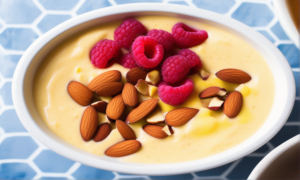 Diet and Health: 10 Practical Tips for Controlling Diabetes Through Diet
Diabetes primarily manifests in two types: Type 1 and Type 2.
Type 1 diabetes is relatively uncommon and cannot be prevented, while Type 2 diabetes is more prevalent and is largely associated with lifestyle factors such as obesity and sedentary habits.
If blood sugar levels are abnormal but not yet at the diabetes stage, it falls into the category of prediabetes. This indicates a higher risk of developing diabetes in the future.
The good news is that around 80% of Type 2 diabetes cases can be prevented. A specialist nutritionist and Diabetes UK spokesperson, Dr. Grace, shared ten practical tips for individuals with diabetes to manage their condition through diet.
Choose Healthier Carbohydrates:Diabetes patients should reduce sugar intake, as all carbohydrates impact blood sugar levels. It is crucial to understand which foods contain carbohydrates, opting for healthier choices like whole grains, vegetables, fruits, legumes, and dairy. Conversely, limit refined carbohydrates like white bread, white rice, and highly processed foods. For those with Type 1 diabetes, calculating carbohydrate intake can help control blood sugar levels. Seeking guidance from a nutritionist or participating in diabetes education programs recommended by doctors can provide valuable information and assistance.
Limit Salt Intake:Excessive salt consumption raises the risk of hypertension, which, in turn, increases the chances of heart disease and stroke. Given that individuals with diabetes are already at a higher risk for these conditions, it is advisable to consume no more than 6 grams of salt per day (approximately 1 teaspoon). Be mindful that many packaged and semi-processed foods already contain salt. Reducing the intake of processed foods and checking food labels for salt content can be beneficial. Flavoring foods with herbs, spices, and chili is a healthier alternative if you find low-salt options less tasty.
Include Legumes and Fish in Your Diet:Consuming oily fish is advantageous for individuals with diabetes. Reducing the intake of red and processed meats, such as bacon, ham, and sausages, is associated with a lower risk of cardiovascular diseases and certain cancers. Legumes, eggs, fish, poultry, and nuts can replace red meat. Vegetables like peas, lentils, and beans are rich in fiber and have minimal impact on blood sugar levels, making them suitable meat substitutes. Aim to eat two servings of oily fish per week, including salmon, sardines, and mackerel, which are rich in omega-3 fatty acids, beneficial for preventing heart disease—a heightened risk for those with diabetes.
Consume More Fruits and Vegetables:Incorporate fruits and vegetables into meals and use them as snacks. Fruits and vegetables provide essential vitamins, minerals, and fiber. Opt for whole fruits instead of fruit juices, and consume them in moderation throughout the day. Fresh, frozen, canned, and dried fruits all contribute to a healthy diet.
Choose Healthy Fats:Nuts, seeds, avocados, olive oil, and oily fish contain beneficial healthy fats. When cooking, consider using plant oils such as olive oil, rapeseed oil, peanut oil, corn oil, and sunflower oil instead of saturated fats like palm oil, coconut oil, butter, and lard. Employ cooking methods like baking, steaming, and grilling instead of deep frying.
Limit Sugar Intake:Weight management aids in diabetes prevention. Avoid sugary drinks, energy drinks, and fruit juices, opting for water, unsweetened milk, coffee, and tea. Reduce consumption of sugary cakes, snacks, and biscuits, as well as foods containing added fructose and polyols. Artificial sweeteners may help reduce calorie intake and sugar consumption.
Choose Healthy Snacks:If you crave snacks, opt for items like yogurt, unsalted nuts, seeds, fruits, and vegetables instead of chips, fries, cookies, and chocolate. Pay attention to portion sizes when snacking.
Moderate Alcohol Consumption:Drinking alcohol on an empty stomach is not advisable, especially for those taking insulin or other diabetes medications, as it can increase the risk of hypoglycemia. If consuming alcohol, limit it to a maximum of 14 alcohol units per week, and avoid binge drinking. Try to have alcohol-free days each week. Remember: One alcohol unit is equivalent to 25 milliliters of spirits or 284 milliliters of standard beer or cider. A small glass (125 milliliters) of wine is actually 1.5 alcohol units. Alcohol is high in calories, so consider reducing alcohol intake if weight loss is a goal.
Be Cautious with Diabetes-Specific Foods:Be wary of so-called "diabetes-friendly" foods, as they often provide no additional benefits for diabetes patients and can still impact blood sugar levels. These foods typically contain similar amounts of fats and calories as regular items and are often more expensive.
Prioritize Dietary Changes over Supplements:There is no evidence that vitamin and mineral supplements aid in diabetes control. It is unnecessary to take supplements unless there is a specific risk of deficiency or a medical need for a particular supplement (e.g., folic acid for pregnant women). Obtaining necessary nutrients through a varied diet is the best approach. If there are concerns about nutritional deficiencies, consult a doctor before taking supplements, as some may interfere with medication effectiveness or worsen certain diabetes complications, such as kidney disease.
Additionally, regular physical activity is crucial. Staying active helps manage diabetes and reduces the risk of cardiovascular diseases. Aim for at least 150 minutes of moderate-intensity exercise per week, breaking it down into sessions of at least 10 minutes each for easier adherence.
In conclusion, maintaining an active lifestyle, avoiding prolonged sitting, and engaging in regular physical activity are essential for overall well-being. Even a short walk around can be beneficial for both the body and mind.
Diet and Health: 10 Practical Tips for Controlling Diabetes Through Diet
Diabetes primarily manifests in two types: Type 1 and Type 2.
Type 1 diabetes is relatively uncommon and cannot be prevented, while Type 2 diabetes is more prevalent and is largely associated with lifestyle factors such as obesity and sedentary habits.
If blood sugar levels are abnormal but not yet at the diabetes stage, it falls into the category of prediabetes. This indicates a higher risk of developing diabetes in the future.
The good news is that around 80% of Type 2 diabetes cases can be prevented. A specialist nutritionist and Diabetes UK spokesperson, Dr. Grace, shared ten practical tips for individuals with diabetes to manage their condition through diet.
Choose Healthier Carbohydrates:Diabetes patients should reduce sugar intake, as all carbohydrates impact blood sugar levels. It is crucial to understand which foods contain carbohydrates, opting for healthier choices like whole grains, vegetables, fruits, legumes, and dairy. Conversely, limit refined carbohydrates like white bread, white rice, and highly processed foods. For those with Type 1 diabetes, calculating carbohydrate intake can help control blood sugar levels. Seeking guidance from a nutritionist or participating in diabetes education programs recommended by doctors can provide valuable information and assistance.
Limit Salt Intake:Excessive salt consumption raises the risk of hypertension, which, in turn, increases the chances of heart disease and stroke. Given that individuals with diabetes are already at a higher risk for these conditions, it is advisable to consume no more than 6 grams of salt per day (approximately 1 teaspoon). Be mindful that many packaged and semi-processed foods already contain salt. Reducing the intake of processed foods and checking food labels for salt content can be beneficial. Flavoring foods with herbs, spices, and chili is a healthier alternative if you find low-salt options less tasty.
Include Legumes and Fish in Your Diet:Consuming oily fish is advantageous for individuals with diabetes. Reducing the intake of red and processed meats, such as bacon, ham, and sausages, is associated with a lower risk of cardiovascular diseases and certain cancers. Legumes, eggs, fish, poultry, and nuts can replace red meat. Vegetables like peas, lentils, and beans are rich in fiber and have minimal impact on blood sugar levels, making them suitable meat substitutes. Aim to eat two servings of oily fish per week, including salmon, sardines, and mackerel, which are rich in omega-3 fatty acids, beneficial for preventing heart disease—a heightened risk for those with diabetes.
Consume More Fruits and Vegetables:Incorporate fruits and vegetables into meals and use them as snacks. Fruits and vegetables provide essential vitamins, minerals, and fiber. Opt for whole fruits instead of fruit juices, and consume them in moderation throughout the day. Fresh, frozen, canned, and dried fruits all contribute to a healthy diet.
Choose Healthy Fats:Nuts, seeds, avocados, olive oil, and oily fish contain beneficial healthy fats. When cooking, consider using plant oils such as olive oil, rapeseed oil, peanut oil, corn oil, and sunflower oil instead of saturated fats like palm oil, coconut oil, butter, and lard. Employ cooking methods like baking, steaming, and grilling instead of deep frying.
Limit Sugar Intake:Weight management aids in diabetes prevention. Avoid sugary drinks, energy drinks, and fruit juices, opting for water, unsweetened milk, coffee, and tea. Reduce consumption of sugary cakes, snacks, and biscuits, as well as foods containing added fructose and polyols. Artificial sweeteners may help reduce calorie intake and sugar consumption.
Choose Healthy Snacks:If you crave snacks, opt for items like yogurt, unsalted nuts, seeds, fruits, and vegetables instead of chips, fries, cookies, and chocolate. Pay attention to portion sizes when snacking.
Moderate Alcohol Consumption:Drinking alcohol on an empty stomach is not advisable, especially for those taking insulin or other diabetes medications, as it can increase the risk of hypoglycemia. If consuming alcohol, limit it to a maximum of 14 alcohol units per week, and avoid binge drinking. Try to have alcohol-free days each week. Remember: One alcohol unit is equivalent to 25 milliliters of spirits or 284 milliliters of standard beer or cider. A small glass (125 milliliters) of wine is actually 1.5 alcohol units. Alcohol is high in calories, so consider reducing alcohol intake if weight loss is a goal.
Be Cautious with Diabetes-Specific Foods:Be wary of so-called "diabetes-friendly" foods, as they often provide no additional benefits for diabetes patients and can still impact blood sugar levels. These foods typically contain similar amounts of fats and calories as regular items and are often more expensive.
Prioritize Dietary Changes over Supplements:There is no evidence that vitamin and mineral supplements aid in diabetes control. It is unnecessary to take supplements unless there is a specific risk of deficiency or a medical need for a particular supplement (e.g., folic acid for pregnant women). Obtaining necessary nutrients through a varied diet is the best approach. If there are concerns about nutritional deficiencies, consult a doctor before taking supplements, as some may interfere with medication effectiveness or worsen certain diabetes complications, such as kidney disease.
Additionally, regular physical activity is crucial. Staying active helps manage diabetes and reduces the risk of cardiovascular diseases. Aim for at least 150 minutes of moderate-intensity exercise per week, breaking it down into sessions of at least 10 minutes each for easier adherence.
In conclusion, maintaining an active lifestyle, avoiding prolonged sitting, and engaging in regular physical activity are essential for overall well-being. Even a short walk around can be beneficial for both the body and mind.
Classics Games
Hot Recipes
Latest Lists
 Low-Calorie Mango-Almond Smoothie Bowl
Low-Calorie Mango-Almond Smoothie Bowl
 Low-Calorie Huevos Rancheros Tacos
Low-Calorie Huevos Rancheros Tacos
 Low-Calorie Strawberry-Banana Protein Smoothie
Show All
Low-Calorie Strawberry-Banana Protein Smoothie
Show All
 Lemon-Garlic Shrimp with Sautéed Broccoli
Lemon-Garlic Shrimp with Sautéed Broccoli
 Honey-Glazed Roasted Golden Beets with Thyme
Honey-Glazed Roasted Golden Beets with Thyme
 Sesame-Ginger Cabbage Stir-Fry
Show All
Sesame-Ginger Cabbage Stir-Fry
Show All

 Follow
Follow



